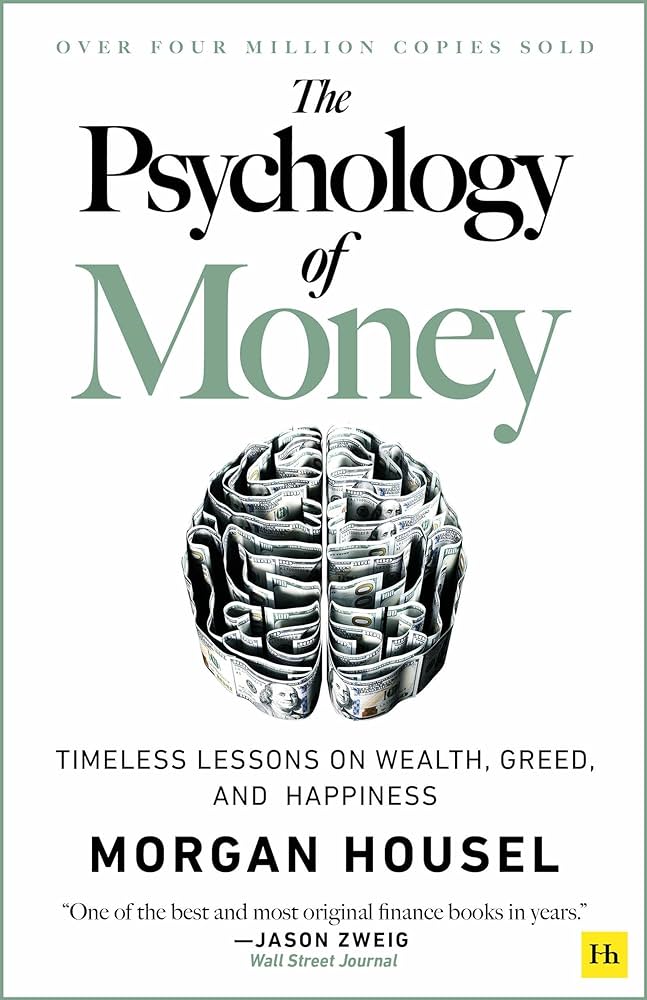The Psychology of Money explains how behavioral forces in personal finance play a larger role than the underlying math and logic of investing. Morgan explains that the optimal approach to investing is having a barbelled personality, where you’re optimistic about the future but paranoid about what will prevent you from getting there. This mindset allows you to have a margin of safety without being overly conservative. A margin of safety raises the odds of success at a given level of risk by increasing your chances of survival, whereas being conservative means avoiding a certain level of risk.
For long term investing, the key is creating a strategy where bad outcomes are survivable so that you can hang benefit when the odds return to your favor. Under this mindset, short term losses are proactively accepted as a cost along the way.
In contrast, a primary goal of short term investing is to provide a means to address a disruption in income (such as taking time off or retirement) or a large expense. With this mindset, a cash investment yields a much higher return than its intrinsic level when it allows you to leave your long term investments alone (i.e., providing a buffer to wait for the right next job or for the market to recover).
This book has helped me better understand consumer investment behavior and, in turn, how to better create solutions that optimize their needs. As a bonus, I noticed how the short term vs long term mindset has a broader application to many life decisions beyond investing.
You should read this book if you…
- want a better understanding of how to save
- could benefit from learning the difference between being financially conservative and having a margin of safety
- want to learn about the behavioral forces affecting your investment returns
Additional Information
Year Published: 2020
Book Ranking (from 1-10): 8 – Very Good – In depth insights on a specific topic
Ease of Read (from 1-5): 2 – Quick read
Key Highlights
- Financial success is not a hard science. It’s a soft skill, where how you behave is more important than what you know. I call this soft skill the psychology of money
- Engineers can determine the cause of a bridge collapse because there’s agreement that if a certain amount of force is applied to a certain area, that area will break. Physics isn’t controversial. It’s guided by laws. Finance is different. It’s guided by people’s behaviors. And how I behave might make sense to me but look crazy to you
- In theory people should make investment decisions based on their goals and the characteristics of the investment options available to them at the time. But that’s not what people do. The economists found that people’s lifetime investment decisions are heavily anchored to the experiences those investors had in their own generation—especially experiences early in their adult life
- Buying a lottery ticket is the only time in our lives we can hold a tangible dream of getting the good stuff that you already have and take for granted. We are paying for a dream, and you may not understand that because you are already living a dream. That’s why we buy more tickets than you do
- It was not until the 1980s that the idea that everyone deserves, and should have, a dignified retirement took hold. And the way to get that dignified retirement ever since has been an expectation that everyone will save and invest their own money. Let me reiterate how new this idea is: The 401(k)—the backbone savings vehicle of American retirement—did not exist until 1978. The Roth IRA was not born until 1998
- The trick when dealing with failure is arranging your financial life in a way that a bad investment here and a missed financial goal there won’t wipe you out so you can keep playing until the odds fall in your favor. But more important is that as much as we recognize the role of luck in success, the role of risk means we should forgive ourselves and leave room for understanding when judging failures. Nothing is as good or as bad as it seems
- The hardest financial skill is getting the goalpost to stop moving. But it’s one of the most important
- The idea of having “enough” might look like conservatism, leaving opportunity and potential on the table. I don’t think that’s right. “Enough” is realizing that the opposite—an insatiable appetite for more—will push you to the point of regret
- Applying the survival mindset to the real world comes down to appreciating three things. 1. More than I want big returns, I want to be financially unbreakable. And if I’m unbreakable I actually think I’ll get the biggest returns, because I’ll be able to stick around long enough for compounding to work wonders
- Room for error—often called margin of safety—is one of the most underappreciated forces in finance. It comes in many forms: A frugal budget, flexible thinking, and a loose timeline—anything that lets you live happily with a range of outcomes. It’s different from being conservative
- Conservative is avoiding a certain level of risk. Margin of safety is raising the odds of success at a given level of risk by increasing your chances of survival
- A barbelled personality—optimistic about the future, but paranoid about what will prevent you from getting to the future—is vital
- Napoleon’s definition of a military genius was, “The man who can do the average thing when all those around him are going crazy.” It’s the same in investing
- Money’s greatest intrinsic value—and this can’t be overstated—is its ability to give you control over your time
- The only way to be wealthy is to not spend the money that you do have. It’s not just the only way to accumulate wealth; it’s the very definition of wealth
- Wealth is hidden. It’s income not spent. Wealth is an option not yet taken to buy something later. Its value lies in offering you options, flexibility, and growth to one day purchase more stuff than you could right now
- If you have flexibility you can wait for good opportunities, both in your career and for your investments. You’ll have a better chance of being able to learn a new skill when it’s necessary. You’ll feel less urgency to chase competitors who can do things you can’t, and have more leeway to find your passion and your niche at your own pace. You can find a new routine, a slower pace, and think about life with a different set of assumptions. The ability to do those things when most others can’t is one of the few things that will set you apart in a world where intelligence is no longer a sustainable advantage
- Academic finance is devoted to finding the mathematically optimal investment strategies. My own theory is that, in the real world, people do not want the mathematically optimal strategy. They want the strategy that maximizes for how well they sleep at night
- Benjamin Graham is known for his concept of margin of safety. He wrote about it extensively and in mathematical detail. But my favorite summary of the theory came when he mentioned in an interview that “the purpose of the margin of safety is to render the forecast unnecessary.” It’s hard to overstate how much power lies in that simple statement
- It’s hard to grasp that other investors have different goals than we do, because an anchor of psychology is not realizing that rational people can see the world through a different lens than your own
- Real optimists don’t believe that everything will be great. That’s complacency. Optimism is a belief that the odds of a good outcome are in your favor over time, even when there will be setbacks along the way. The simple idea that most people wake up in the morning trying to make things a little better and more productive than wake up looking to cause trouble is the foundation of optimism. It’s not complicated. It’s not guaranteed, either. It’s just the most reasonable bet for most people, most of the time

Discover more from The Broader Application
Subscribe to get the latest posts sent to your email.
